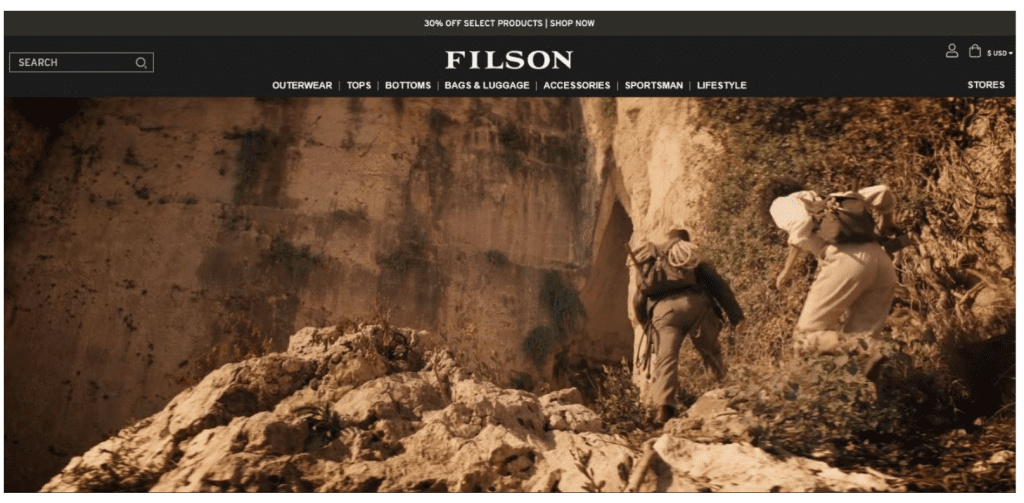Indiana Jones – or better yet, backpacks that appear in the latest film in the franchise – is at the center of an interesting new lawsuit. According to the false designation of origin complaint that it filed in a California federal court on July 19, Frost River asserts that Lucasfilm and fellow defendant Filson are running afoul of the Lanham Act for “misappropriating [its] successful ‘Geologist Pack’ and other Frost River products for use in ‘Indiana Jones and the Dial of Destiny.’” Specifically, Frost River claims that Lucasfilm used its products in the film “without consulting [it] or obtaining permission to do so.”
“Lucasfilm never obtained Frost River’s permission to use any of Frost River’s products in Indiana Jones 5,” the Minnesota-based apparel and outdoors gear brand contends. “Instead, in an effort to obscure Frost River’s connection to the Geologist Pack and Simple Book Pack,” Lucasfilm “removed both the oval stamped leather patch [which depicts Frost River’s trademark] and the red taffeta,” which “features Frost River’s trademark and the proclamation that the pack was manufactured in Duluth, Minnesota,” and which serves to “signify that it is an authentic Frost River product.”
Frost River alleges that in addition to failing to secure its authorization to the backpacks in the Indiana Jones film (more about that in a minute), Lucasfilm partnered with Filson, “a direct competitor of Frost River,” for a joint marketing campaign to promote the film. The Lucasfilm-Filson campaign consists of a 60-second television commercial that featured clips of the Indiana Jones character wearing Frost River’s products, including the Geologist Pack. “Indeed, Lucasfilm and Filson were so brazen in their marketing and disregard for Frost River’s rights to its intellectual property,” the plaintiff claims, that the campaign is appeared on Filson’s website, where Filson advertises its own luggage, packs, and duffels for sale.
“A consumer visiting Filson’s website is led to believe, by implication, that the bags featured in the Indiana Jones 5 film were manufactured by Filson and are genuine Filson products,” according to Frost River.

TLDR: Frost River alleges that Lucasfilm and Filson “used Frost River’s own products to advertise for Filson, a direct competitor … This is a quintessential example of ‘reverse passing off,’ and is unfair and prohibited under the Lanham Act,” as it amounts to false designation of origin.
Frost River maintains that Lucasfilm and Filson’s “actionable and wrongful conduct” has caused it to suffer “commercial and competitive injury.” With the foregoing in mind, it accuses the defendants of violating section 43(a) of the Lanham Act and is seeking compensatory damages in an amount to be proven at trial but in any event no less than $75,000, as well as punitive and exemplary damages.
Caterpillar, Wham-O, and Indiana Jones
A particularly interesting aspect of the complaint is the two companies’ joint marketing campaign, as it seems that without that, Frost River might lack legal grounds to pursue Lucasfilm. After all, filmmakers generally do not need to secure authorization to use others’ products –trademark-bearing or otherwise – in a film. “If the film does not misrepresent the source of the product and does nothing that would have a negative impact on the value of the trademark, there is no legal prohibition on the use of a trademark in a film,” per entertainment attorney Lisa Callif. Meanwhile, King & Spalding partner Aaron Craig Partner stated in an article that save for some exceptions, “Depictions of trademarked products in film and movies is fair game, not only because of the ‘nominative use’ defense (use of a mark to identify or refer to the mark-holder’s product), but on broader First Amendment principles.”
And there is at least some case law to back up that assertion. In the Caterpillar Inc. v. Walt Disney Co. case, for instance, an Illinois federal court shot down Caterpillar’s attempt to block the release of “George of the Jungle 2.” Caterpillar lodged trademark-centric causes of action against Disney after it used Caterpillar equipment in the film without its authorization. Siding with Disney, the court found that, among other things, Caterpillar was unable to establish that Disney’s use of construction vehicles with Caterpillar logos created a likelihood of confusion among consumers that Caterpillar sponsored or was otherwise affiliated with the movie.
The court distinguished that case from some of those cited by Caterpillar, including Dallas Cowboys Cheerleaders, Inc. v. Pussycat Cinema, Ltd., in light of “the seeming absence of any intent [by Disney] to free ride on the fame of Caterpillar’s trademarks.” In that case, Dallas Cowboys Cheerleaders, Inc. successfully blocked Pussycat Cinema’s release of “Debbie Does Dallas” on the basis that its adoption of “the distinctive trade dress of the Dallas Cowboy cheerleaders” and release of an advertising campaign that “insinuate[ed] that the actress in the pornographic film was [a Dallas Cowboy cheerleader]” made it so that the movie was aiming to capitalize on the cheerleaders’ trademark to drive sales of the movie.
Around that same time as Caterpillar v. Disney, Wham-O, the maker of the Slip ‘n’ Slide, filed suit against Paramount Pictures over the film studio’s alleged misuse of the trademark-protected toy name in the film, “Dickie Roberts: Former Child Star,” as well as in the advertising and promotional materials for the movie. Dealing Wham-O a loss in 2003, the U.S. District Court for the N.D. of California held that “like any other portion of the film’s dialogue or set,” the Slip ‘n’ Slide “forms part of the film’s jumble of imagery; it is not highlighted to exploit the value of [Wham-O’s] mark.” And beyond that, the court held that Paramount’s use of the toy gave rise to “nothing that would, in conjunction with the mark, suggest sponsorship or endorsement [of the film] by the trademark holder.”
Put another way, the court held, “As any moviegoer can attest, it is not unusual for movie producers to use … products and props … to cultivate interest in a film. Films with car chases do so with cars; films with gunplay do so with firearms; films with haute couture wardrobes do so with clothing. Nothing in the record suggests [that Paramount] used [Wham-O’s] marks to imply that [Wham-O] placed its imprimatur on the film; nowhere in [Paramount’s] publicity efforts is [Wham-O’s] mark unreasonably displayed or abused. [Paramount], instead, used the marks and product in a specific and unique descriptive sense: to evoke associations with an iconic child’s toy.”
Against the background of those cases and others like them, the key trademark issue here unsurprisingly stems not so much from the use of the Frost River backpacks on their own in the Indiana Jones film, on its own, especially since Lucasfilm does not look to be misrepresenting the source of the backpacks in the film, itself. In fact, given that it removed the trademark elements, namely, the oval stamped leather patch and the red taffeta, Lucasfilm is not indicating the source of the bags at all. Instead, the core of the case appears to center more on the alleged likelihood that consumers will confuse the source of the Frost River backpacks in the film as a result of the co-branded campaign with Filson (i.e., in a context that may be confusing), but even then, this may not be an easy win for Frost River.
The case is Superior Tech LLC v. C. C. Filson Co., et al., 5:23-cv-03581 (N.D. Cal.).











